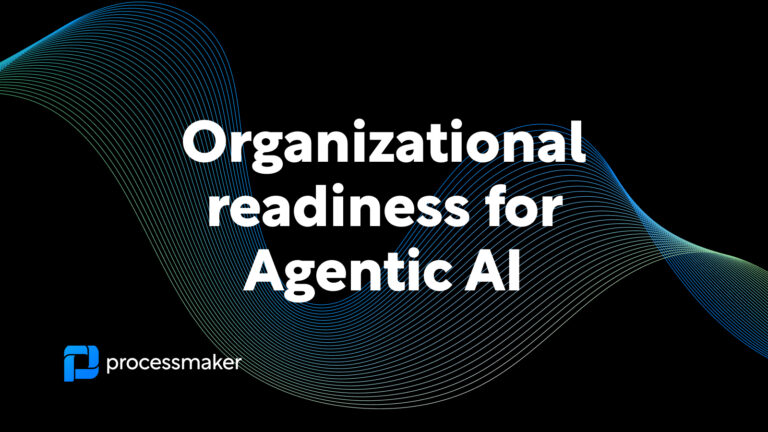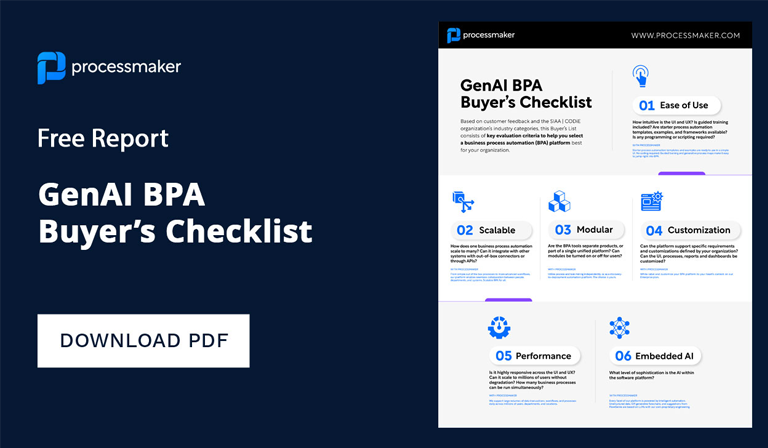In today’s rapidly evolving business landscape, organizations face a transformative shift in automation capabilities. Agentic AI—artificial intelligence that operates with autonomy, intent, and contextual awareness—is redefining what’s possible in business process automation.
Agentic AI can assess context, adapt actions, and initiate tasks without direct human intervention, representing a significant leap forward in how businesses approach workflow optimization.
This self-directed approach to automation operates with a degree of independence and learning capability that enables it to adapt as it interacts with real-world environments and data streams, creating opportunities for unprecedented operational efficiency.
Assessing your organization’s readiness for Agentic AI
1. Process maturity assessment
The journey toward Agentic AI implementation begins with understanding your current process landscape. Organizations should ask:
- Have we documented and standardized our core business processes?
- Do we have visibility into process performance metrics and bottlenecks?
- Can we identify “agentic opportunities”—strategic points where autonomous capabilities would add the most value?
ProcessMaker emphasizes that “the real transformation isn’t about replacing traditional automation entirely, but identifying strategic ‘agentic opportunities’ within processes.” This balanced approach preserves human judgment where it matters while eliminating tedious, repetitive tasks.
2. Technical infrastructure evaluation
Agentic AI requires robust technical foundations. Evaluate your organization’s:
- Data architecture and quality (Is your data accessible, reliable, and integrated across systems?)
- API connectivity between core systems
- Cloud infrastructure capabilities
- Real-time analytics capabilities
Organizations without strong data integration may need to prioritize this foundation before advancing to sophisticated Agentic AI implementations.
3. Governance framework development
As AI systems gain autonomy, governance becomes increasingly critical. Ready organizations have:
- Clear policies regarding AI decision-making authority
- Oversight mechanisms for autonomous systems
- Audit trails for AI-initiated actions
- Risk management strategies for AI-related contingencies
4. Workforce preparation and skill development
Agentic AI will transform roles and responsibilities throughout your organization. Readiness requires:
- Upskilling employees to work alongside intelligent systems
- Redefining job roles to emphasize human creativity and strategic thinking
- Preparing leadership to manage hybrid human-AI teams
- Building organizational change management capabilities
As ProcessMaker notes, employees will be “freed from repetitive tasks, allowing them to focus on higher-value, strategic work.” Organizations must prepare for this shift in workforce allocation.
5. Strategic alignment and vision
Finally, successful Agentic AI adoption requires clear strategic direction:
- Has leadership articulated how Agentic AI aligns with business objectives?
- Are there defined success metrics for Agentic AI initiatives?
- Is there a roadmap for progressive implementation across the organization?
- Has the organization considered the competitive landscape and industry-specific applications?
The implementation roadmap: from traditional to Agentic automation
Organizations typically progress through several stages on their journey to Agentic AI maturity:
- Foundational process automation – Establishing basic workflow automation and standardization
- Enhanced intelligence – Incorporating analytics and basic machine learning into workflows
- Hybrid autonomy – Introducing selective autonomy in low-risk, high-value process areas
- Integrated agentic systems – Developing comprehensive, interconnected intelligent systems
- Transformative business models – Reimagining operations and customer experiences through Agentic capabilities
This evolution is not merely technical but represents a fundamental transformation in how organizations conceptualize process management.
Business benefits of becoming Agentic AI-ready
Organizations that successfully prepare for and implement Agentic AI can expect several transformative benefits:
- Operational efficiency: Significant reduction in manual effort, operational costs, and processing times
- Enhanced experiences: More intuitive, responsive interactions for both customers and employees
- Business agility: Real-time adaptation to market changes and customer needs
- Improved compliance: Proactive detection of anomalies and automatic rule enforcement
- Strategic focus: Employees redirected from routine tasks to innovation and customer engagement
- Competitive advantage: Creation of intelligent ecosystems that can adapt and scale with business needs
The most successful implementations will blend traditional automation with Agentic capabilities, maintaining human oversight where critical, while embedding autonomous capabilities where they add the most value.
Common challenges and mitigation strategies
Despite the compelling benefits, organizations face several challenges when preparing for Agentic AI:
- Change resistance: Address through education, involvement in design, and clear communication about how Agentic AI will enhance rather than replace human roles
- Technical complexity: Manage by adopting incremental implementation approaches, starting with contained use cases before expanding
- Ethical considerations: Develop explicit principles and governance frameworks for autonomous systems, with particular attention to transparency and accountability
- Integration with legacy systems: Create API layers and middleware solutions to connect traditional systems with new Agentic capabilities
- Skills gap: Invest in training programs, strategic hiring, and partnerships with external experts to build necessary capabilities
The future of work is agentic
Organizations that prepare for Agentic AI today position themselves at the forefront of the next evolution in business operations. By thoughtfully blending structure with autonomy, businesses can transform process automation from a tactical efficiency tool into a true strategic advantage.
The most successful organizations will approach this transition with both ambition and pragmatism—identifying high-value opportunities for autonomous capabilities while maintaining appropriate human oversight. As ProcessMaker’s CEO Alex George notes, “This ability to have the best of both worlds makes it possible to automate complete processes, and scale to automate complete job functions.”

By assessing organizational readiness across process maturity, technical infrastructure, governance frameworks, workforce preparation, and strategic alignment, businesses can build a foundation for successful Agentic AI implementation that drives lasting competitive advantage.
Read more about Agentic AI:
Whitepaper: Agentic AI at ProcessMaker
Agentic AI in Process Automation
Making AI Inclusive for Non-Technical Teams
Ethical Considerations of Agentic AI
Barriers to AI Adoption in Business Process Automation
The Perfect Partnership of BPA and AI
Unlocking the Full Potential of AI: Why Task Mining is Your Secret Weapon
Use cases:
5 Ways Agentic AI Transforms Employee Experiences
Automation in Investment Analysis: How Agentic AI is Transforming the Industry


